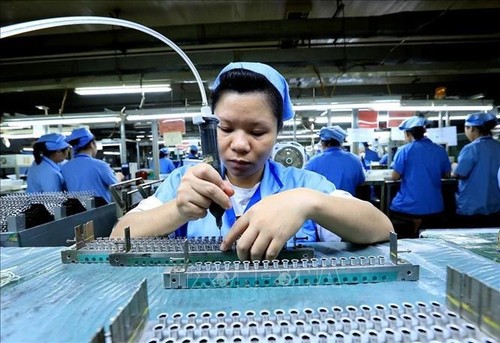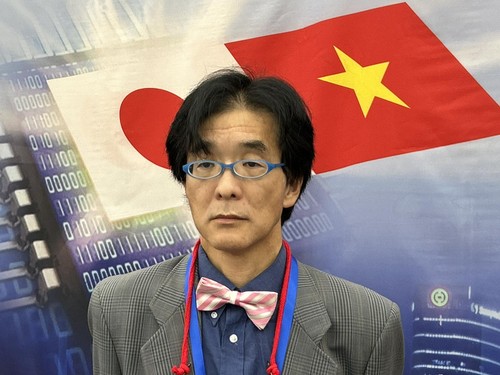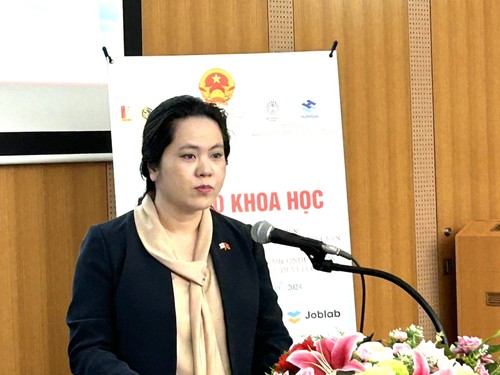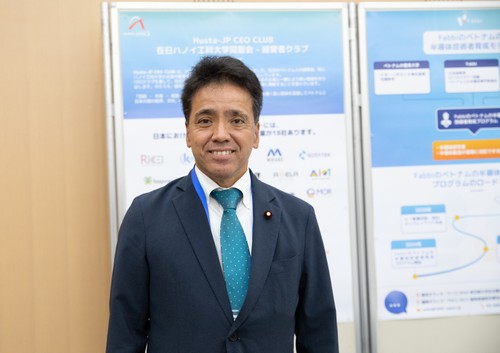 Manufacturing and processing components at Sankoh Vietnam Company of Japan in Hoa Binh province - Illustrative image (Photo: VNA) Manufacturing and processing components at Sankoh Vietnam Company of Japan in Hoa Binh province - Illustrative image (Photo: VNA) |
Both Vietnam and Japan consider semiconductors a key economic sector, which is indispensable to their future. Japanese partners recognize Vietnam’s semiconductor potential, said Dr. Tanimoto Jun, Executive Vice President of Kyushu University, at a workshop on semiconductor innovation and human resource development in Fukuoka, Japan.
 Dr. Tanimoto Jun, Executive Vice President of Kyushu University (Photo: Tuan Nhat/VOV) Dr. Tanimoto Jun, Executive Vice President of Kyushu University (Photo: Tuan Nhat/VOV) |
“The semiconductor industry is strategically important. Japan is intensifying research and development in this field but can’t achieve its goals alone,” said Tanimoto, adding, “Because Vietnam has a great potential for semiconductor development, it has become an important partner of Japan in this industry. The many Vietnamese students who are studying semiconductors at Kyushu University will become the core of the Japan-Vietnam semiconductor network.”
Both countries need to work together and are sure to see great achievements in the near future, said Vu Chi Mai, Vietnam’s Consul General to Fukuoka.
“Semiconductors play a crucial role in modern industry, serving as the technological foundation for key manufacturing sectors. Innovation is a crucial factor in the growth and competitiveness of Vietnam’s semiconductor industry. Cooperation between Vietnam and Japan in this field is immensely important,” said Mai.
 Vu Chi Mai, Vietnam’s Consul General to Fukuoka (Photo: Tuan Nhat/VOV) Vu Chi Mai, Vietnam’s Consul General to Fukuoka (Photo: Tuan Nhat/VOV) |
Dr. Soramoto Seiki, a member of the Japanese House of Representatives and an expert on atomic energy and semiconductors, said that this new direction is pivotal for deepening the bilateral relationship.
“Vietnam is a country with vast resources and a rapidly developing level of technology. Joint semiconductor research and development will benefit both Japan and Vietnam in the short, medium, and long term. What we need now is a legal framework for speeding up this process as soon as possible,” said Soramoto.
He suggested that Japanese experts be sent to Vietnam and Vietnamese experts come to Japan to take part in research and share experience and knowledge about semiconductors.
“Vietnamese people are capable of and can contribute to semiconductor breakthroughs. Increasing the exchange of experts is vital. It will strongly boost the design and manufacturing of semiconductor products, fully tap the potential of semiconductors, and complement each other in human resources,” said Soramoto, adding, “Human resource training should be a starting point for fostering Japanese-Vietnamese semiconductor cooperation.”
 Dr. Soramoto Seiki, a member of the Japanese House of Representatives (Photo: Tuan Nhat/VOV) Dr. Soramoto Seiki, a member of the Japanese House of Representatives (Photo: Tuan Nhat/VOV) |
According to Soramoto, who has been involved in Japan’s semiconductor policy making, the design, manufacturing, solutions, and services related to semiconductors are tasks both sides need to be focused on.
“Japan is now in the stage of developing new-generation semiconductor products. This is a premise for the two countries to move forward side by side. In addition, a mechanism should be created for Japan and Vietnam to penetrate regional and global markets and the semiconductor value chain,” Soramoto noted.
The Japanese government has announced a semiconductor and AI development strategy to 2030 with a vision to 2035, under which, in the first phase, 10 billion USD will be invested in developing semiconductors and related industries.
Vietnam intends to train 50,000 engineers by 2030 as part of a broader strategy to enhance Vietnam's capabilities in semiconductor technology. Annual revenue of Vietnam’s semiconductor industry is expected to hit 25 billion USD by 2030.
The burgeoning cooperation between Japan and Vietnam in semiconductors reflects a mutual recognition of each other's strengths and potential.